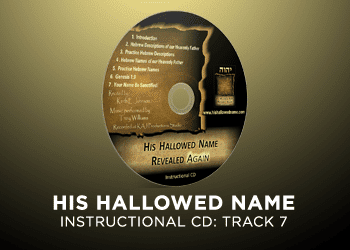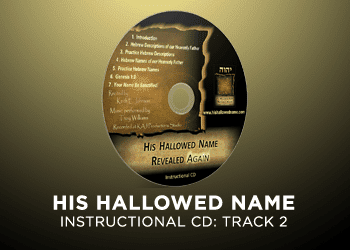And many peoples will come and say, ―Come, let us go up to the mountain of יהוה
ISAIAH 2:3
א
Aleph
Chapter One
Close Encounters
As a result of certain significant events in my life, I came to understand that I was being prepared for a life-changing journey to encounter His hallowed name. In the spring of 2002 I traveled to Jerusalem, Israel, in response to what I believed to be an invitation from our Heavenly Father to an appointment on earth. The time of the meeting was set for the biblical holy day of Shavuot/Pentecost.1 What I encountered radically changed my life, my family, and my ministry. Until recently I kept most of what happened at that meeting private. Before I could share it publicly, I felt compelled to take the time necessary to better understand who our Heavenly Father is according to His word and who I am called to be according to His will. I am now ready.
Before my trip to Jerusalem, I had traveled to the top of Pike’s Peak near Colorado Springs in 2001. As I stood on the top of the mountain on a clear day where I could see for what seemed like hundreds of miles in every direction, I prayed the most radical prayer of my life: “Father, teach me to love what you love and hate what you hate.”
At that moment the great maestro in heaven raised his hands and prepared to conduct a beautiful symphony in my life. I began to see and understand His will and His word in a new way. I could not get enough of the things He loved, and I could not stand the things He hated. I found myself looking for my identity in Him more than trying to find my significance in society.
Eventually a passage in Scripture gave me the freedom and confidence to walk the path He was laying out for me. In fact, it freed me from having to explain why a United Methodist pastor would be so keenly interested in His hallowed name. Neither do I have to force my encounters in Israel into a claim of Jewish blood. It would be impossible to produce records from either side of my family to connect me to one of the tribes of Israel. However, I am privileged to embrace all that my Heavenly Father offers to His children. Here is a portion of the passage that started me on my journey:
Also the foreigners who join themselves to יהוה , to minister to Him, and to love the name יהוה, to be His servants, everyone who keeps from profaning the Sabbath and holds fast My covenant; even those I will bring to My holy mountain and make them joyful in My house of prayer. – ISAIAH 56:6–7
I am a foreigner with no known Israelites in the family tree. Yet my Heavenly Father invited me to join myself to Him, to minister to Him and to love His name. I could not resist. Over the following year I began to study His word as never before. I wanted to know everything I could about the language, history, and culture of my most prized possession: my Bible. I didn’t realize until recently that the invitation in Isaiah was related to my appointment in Israel on His holy mountain.
What I find really encouraging as well as revelatory is that I experienced three encounters that continue to mold and shape me from the inside out. The preacher inside of me wants to say it like this: I encountered His time, His Torah, and His Tetragrammaton.2 Since then I have learned the biblical precedent for my experience. When the people of Israel were delivered from Egypt, they encountered His time, His Torah and his Tetragrammaton.3 Likewise, Isaiah 56:6-7 encourages the foreigners who join themselves to יהוה to also encounter His time, His Torah and His Tetragrammaton—His hallowed name. Amazing.
I wrote about some of this life-changing revelation in A Prayer to Our Father: Hebrew Origins of the Lord’s Prayer. I had been studying with my co-author, Nehemia Gordon, for several years. Our ground-breaking study on the ancient prayer taught by the one called Jesus/Yeshua has been well received by many people of faith from around the world. One of the chapters in the book addresses the well-known English phrase ―hallowed be thy name.” In the Hebrew language, this phrase means ―your name be sanctified.” These four words in both the English and Hebrew versions connect to the single most important revelation I received while in Jerusalem: the meaning and pronunciation of the four Hebrew letters of His hallowed name.
I will never forget that amazing day. Come with me. As Nehemia and I waited to tour the tunnels under Jerusalem, I asked him a question that had intrigued me for a long time: How do you say the name of our Heavenly Father? I had asked this question of many Jewish people before Nehemia, but with no success. They either said it was too holy to pronounce, too profound for me to understand, or too powerful for me to handle and therefore I was prohibited from proclaiming His name. When I asked my new friend Nehemia, who happened to be both Jewish and a Hebrew Bible scholar, he responded by asking me a question: ―”Do you know any Hebrew?”
During the year prior to my trip to Israel, I had reacquainted myself with my Hebrew language studies from seminary. I was excited to respond to his question with a ―”Yes.”
After writing the four Hebrew letters יהוה on a piece of paper, Nehemia went on to give me a short refresher lesson on Hebrew vowels. After his discourse, I asked him to pronounce the name. With no hesitation he said something like, ―”According to the consonants and vowels found in the earliest vocalized Hebrew manuscripts, His name is pronounced. . . .”4
Immediately it felt as if all sights and sounds around us were frozen in time, like a freeze frame of a movie. I looked up and saw a man with a prayer shawl draped over his shoulders standing in front of us, a shofar5 pressed to his lips. The moment Nehemia said the name, the man sent forth two blasts from his shofar. The freeze frame vanished. The pronunciation of the Heavenly Father’s name, combined with the sound of the shofar, reverberated in my ears and revived my heart.
After my movie-like experience was over, I asked Nehemia every question I could think of about the name יהוה . I felt like I was starving inside a buffet restaurant with no money to buy anything to eat. I’d had access to this life-changing name within the Hebrew Bible I owned since seminary, and yet I didn’t have the key to open up the treasure chest that was within its pages. When I settled in my room for the night, I became a man on a mission. I opened up my Hebrew Bible, which happened to be based on one of the very manuscripts Nehemia referenced, and started in Genesis chapter 1 reading one-by-one every single Hebrew letter. I was looking for a four-letter word with three vowels and an accent.
Even though Nehemia is a Hebrew Bible scholar and translator of the Dead Sea Scrolls, his words were not enough. I had experienced something astounding by hearing the name pronounced in concert with two blasts of a shofar, yet I still was not satisfied. Though time was passing into the wee hours of the night, it felt like I was still sitting across from the Western Wall in the beautiful Jerusalem morning air. Every time my eyes would see a י (yod) and then a ה (hey), I would slow down and see if it was the four-letter name with three vowels and an accent.
I still remember what seemed like looking for a needle in a haystack for hours. Then I saw it. Eureka! My eyes stayed fixed on the page as if I were looking at a million dollar lottery ticket while hearing my winning number called. I could hardly contain myself. I was looking at the name of our Heavenly Father in my Hebrew Bible from seminary, written so it could be pronounced just the way I heard it in Jerusalem. I’d had the name in my possession for ten years and never knew it was on my library shelf.
I had come face to face with the pronunciation of four Hebrew letters combined with three vowels which answered the question that had burned in my mind and heart for so long: What is the name that is to be hallowed (sanctified)? These four Hebrew letters sparked a small personal flame in me. Over the next several years I huddled close to the light from this fire and shared the warmth of His name with family and friends.
The publication and subsequent book tour of A Prayer to Our Father: Hebrew Origins of the Lord’s Prayer stoked this private campfire into a public bonfire. It seemed that every time I prayed, preached or proclaimed “Your name be sanctified,” the fire grew inside of me. I experienced what is described by the prophet Jeremiah:
His Hallowed Name Revealed Again incorporates what I have learned over the last several years on the amazing topic of His name. This book presents an opportunity for interested people to inquire, inspect, and be inspired by incredible information about the perfect and hallowed name of our Heavenly Father. My prayer is that my attempt to present this information will motivate you to proclaim, pray, and praise His exalted, glorified, and sanctified name. My prayer will be answered if by the end of this book you learn, as I have,
For those who would like to see the name that ignited the spark in me, here it is written in an ancient Hebrew manuscript by the hand of the scribe Shemu’el ben Ya’acob:
The name of our Heavenly Father written with four consonants, three vowels, and an accent.
For anyone who wants to learn more about what this name means and how to pray, proclaim, praise, and pronounce it, His Hallowed Name Revealed Again is for you!
Enjoy the journey!
1 – Shavuot is a biblical holiday that is celebrated on the fiftieth day after Passover (Leviticus 23:15–22). Pentecost celebrates the outpouring of the Holy Spirit upon the Apostles and pilgrims who traveled to Jerusalem for Shavuot (see Acts 2). This is the only holiday that both Jews and Christians jointly acknowledge and celebrate at the same time!
2 – The Tetragrammaton is the technical term for the four Hebrew letters that represent the name of our Heavenly Father. These four Hebrew letters are represented on the front cover of this book.
3 – See Exodus 12:1-2 and Exodus 19:1 regarding His time, Exodus 20:1-17 for His Torah, and Exodus 3 and 20:1 for His Tetragrammaton.
4 – Vocalized means that the manuscript includes vowels so that each word can be pronounced when read.
5 – The shofar is a ram’s horn that is blown on special occasions throughout the year.
6 – N. Gordon and K. Johnson. A Prayer to Our Father: Hebrew Origins of The Lord’s Prayer. Hilkiah Press, 2009, page 100.



 Download this audio (Members Only)
Download this audio (Members Only)



